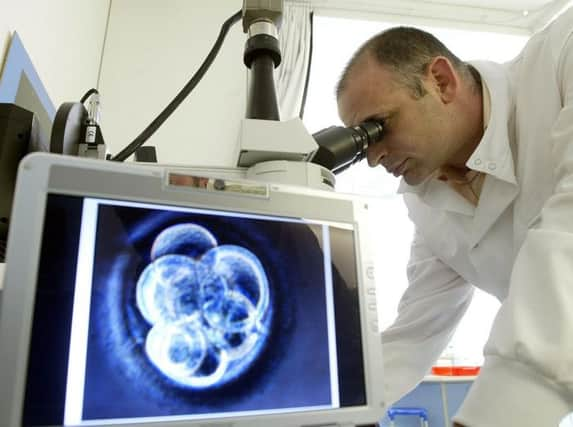Scottish independence: Professors back No vote


A letter from 14 eminent scientists from across the country voices concerns about the effects on research funding if Scotland votes for independence.
They highlight the millions of pounds Scottish institutions currently receive from UK organisations and charities which they say would be in jeopardy if Scotland splits from the Union.
Advertisement
Hide AdAdvertisement
Hide AdTheir intervention was welcomed by pro-Union supporters, but academics speaking for the Yes Scotland campaign rejected the conclusions.
The open letter, published in The Scotsman today, is signed by leading researchers including Sir David Carter, a former chief medical officer, biochemist Prof Jean Beggs, genetics expert Prof Nicholas Hastie and clinical surgery specialist Prof James Garden.
It outlines how Scotland benefits from membership of the UK research funding system. The writers highlight money received through UK Research Council grants totalled £257 million in 2012-13 – 13.1 per cent of the funding available.
The scientists say this is “a remarkable achievement for a country with just 8.4 per cent of the UK population”.
They also point to figures showing that, in 2009-10, Scotland won £180m of funding made available by the 12 largest public and charitable funders of medical research, including the Medical Research Council and Cancer Research UK.
The scientists write: “If Scotland were to withdraw from the UK and create its own Scottish Research Council, our research community would be denied its present ability to win proportionately more grant funding than the country contributes to a common research pool.”
The scientists admit frustration that universities and scientific bodies have felt obliged to remain neutral in the independence debate because they receive Scottish Government funding.
“Their silence should not be interpreted as evidence of tacit support for independence on the part of the life sciences research community,” they write.
Advertisement
Hide AdAdvertisement
Hide Ad“Life sciences research provides thousands of high technology jobs; it is now and can undoubtedly remain a cornerstone of the Scottish economy.
“We contend that Scotland’s research interests will be much better served by remaining within the common research area called the United Kingdom.”
A Better Together spokesman said: “This is a serious intervention from people at the very top of their chosen professions.”
However, Professors Bryan MacGregor and Murray Pittock, of pro-independence group Academics for Yes, pointed to widespread international and European collaboration, and existing collaboration within the British Isles. They said: “Several bilateral arrangements exist between the UK and the Republic of Ireland.
“Why would an independent Scotland be treated differently?”
They said the “real threat” to research in universities was continued participation in the Union, adding: “Independence would not harm the research base – independence would protect it and allow it to thrive.”
SEE ALSO